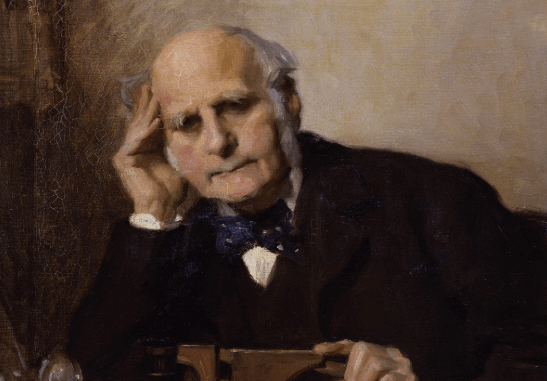British anthropologist, geographer, inventor, meteorologist, statistician, psychologist and eugenicist, cousin of Charles Darwin and grandson of Erasmus Darwin, Francis Galton was one of the most creative minds of the 19th century, and today we will talk about his biography.
Galton belonged to the British upper class. He was a professional scientist who barely corresponded to a specific discipline, the creator of the English biometric school, his contributions in fields as diverse as meteorology and psychology, among others, have been extraordinary.
- He spent much of his life traveling.
- Like many other scholars of the time.
- And ended up dedicating himself entirely to scientific research.
- After spending time in meteorology.
- He developed a growing interest in anthropology.
- Inspired by his cousin Darwin’s book The Origin of Species.
- As a result.
- He became an advocate and ideologian of eugenics.
- The discipline that advocated the application of biological laws to perfect the human species.
His contributions to individual differences are very important in the field of psychology; In fact, Galton is considered a precursor to knowledge of the genetic basis of cognitive ability, was the first to scientifically study the genetic and environmental causes of individual differences in humans.
Francis Galton’s biography begins in Duddeston, England, where he was born in 1822, and was a child prodigy. By the age of five he already had knowledge of mathematics, Greek and Latin, and by six he was already having fun with adult books.
He attended school until he was sixteen, when he decided to drop out of school because of the program that bothered him, as a child his family encouraged him to study medicine, a science he would study at King’s College London. He studied mathematics at Trinity College and the University of Cambridge. It was Dalton himself who, years later, alluded to the relationship between genius and madness from his own experience.
In 1844, he devoted his time to travel: he went to ancient Constantinople and crossed Eastern Europe, arrived in Egypt, Sudan, Beirut, Damascus and the Jordan Valley, then embarked on a long expedition to Namibia and after a time to Spain. After these trips, he published two books: Explorer in Tropical South Africa (1853) and The Art of Travel in 1855.
Married in 1853, the marriage lasted 43 years, although they had no children, it was from 1860 that Francis Galton devoted himself entirely to scientific research, his taste for mathematics led him to develop knowledge in different fields.
In meteorology, he created the first weather maps published by the Times and coined the term anticyclone. On the other hand, his research on the human mind required a detailed record of subjective concepts and how the mind processes mental images. To put it into practice, he used research methods and questionnaires, having pioneered the use of these. In addition, his contributions to statistics are numerous.
In the field of anthropology he highlighted his theory of inheritance and demographic statistics, topics on which he wrote books such as Hereditary Genius in 1869 and Natural Inheritance in 1889; his theories about inheritance were of great importance in his day, though they were surpassed. by Mendel and Weismann later.
In addition, he highlights his work on fingerprints and eugenics in the field of anthropology.
Francis Galton’s studies on human skills led to the creation of differential psychology and the formulation of early mental evidence through the development of psychometrics.
He had a keer interest in measuring all possible facets of human beings. These include measures of intellectual skill and intelligence.
Galton was the first author to speak of the dilemma between heritage and the environment, a debate that lasted over the years until it is considered, today, as a question of degree between the influential elements.
In 1883 he coined the term eugenics to refer to artificial selection for the improvement of the human race. He concluded that he believed in the possibility of determining a system of “marks” on the merits of the family.
In addition, it also considers that, among upper-class families, early marriage should be encouraged by economic incentives; in fact, he considered subsequent marriages to be disgenic, as well as child shortages.
These and other theories served as the basis for ideals of racial superiority, such as those proclaimed by German Nazism. In this way, the practice of eugenics has led to racial cleansing, sterilization of the disabled, the mentally ill and poor citizens.
England, the United States and some Latin American countries also implemented eugenics programs, but they eventually fell unre apart for their association with Nazism.

